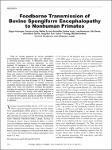Foodborne Transmission of Bovine Spongiform Encephalopathy to Nonhuman Primates
Holznagel, Edgar
Yutzy, Barbara
Schulz-Schaeffer, Walter
Kruip, Carina
Hahmann, Uwe
Bierke, Pär
Torres, Juan-Maria
Kim, Yong-Sun
Thomzig, Achim
Beekes, Michael
Hunsmann, Gerhard
Löwer, Johannes
Risk for human exposure to bovine spongiform encephalopathy (BSE)–inducing agent was estimated in a nonhuman primate model. To determine attack rates, incubation times, and molecular signatures, we orally exposed 18 macaques to 1 high dose of brain material from cattle with BSE. Several macaques were euthanized at regular intervals starting at 1 year postinoculation, and others were observed until clinical signs developed. Among those who received ≥5 g BSE-inducing agent, attack rates were 100% and prions could be detected in peripheral tissues from 1 year postinoculation onward. The overall median incubation time was 4.6 years (3.7–5.3). However, for 3 macaques orally exposed on multiple occasions, incubation periods were at least 7–10 years. Before clinical signs were noted, we detected a non-type 2B signature, indicating the existence of atypical prion protein during the incubation period. This finding could affect diagnosis of variant Creutzfeldt-Jakob disease in humans and might be relevant for retrospective studies of positive tonsillectomy or appendectomy specimens because time of infection is unknown.
No license information
Related Items
Show related Items with similar Title, Author, Creator or Subject.
-
2001-05-01ZeitschriftenartikelDie bovine spongiforme Enzephalopathie (BSE) des Rindes und deren Übertragbarkeit auf den Menschen Robert Koch-Institut
-
2013-03-11ZeitschriftenartikelTowards further reduction and replacement of animal bioassays in prion research by cell and protein misfolding cyclic amplification assays Boerner, Susann; Wagenführ, Katja; Daus, Martin L.; Thomzig, Achim; Beekes, MichaelLaboratory animals have long since been used extensively in bioassays for prions in order to quantify, usually in terms of median infective doses [ID50], how infectious these pathogens are in vivo. The identification of ...
-
2013-06-01ZeitschriftenartikelBSE-associated Prion-Amyloid Cardiomyopathy in Primates Krasemann, Susanne; Mearini, Giulia; Krämer, Elisabeth; Wagenführ, Katja; Schulz-Schaeffer, Walter; Neumann, Melanie; Bodemer, Walter; Kaup, Franz-Josef; Beekes, Michael; Carrier, Lucie; Aguzzi, Adriano; Glatzel, MarkusPrion amyloidosis occurred in the heart of 1 of 3 macaques intraperitoneally inoculated with bovine spongiform encephalopathy prions. This macaque had a remarkably long duration of disease and signs of cardiac distress. ...

